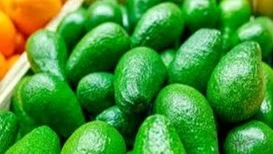TAHA aims high at 2024 Asia Fruit Logistica expo

TANZANIA will seek to make the most of the Asian Fruit Logistica fair in Hong Kong, in its latest efforts to build connections with Chinese importers and explore new export opportunities.
Dr Jacqueline Mkindi, the Tanzania Horticultural Association (TAHA) chief executive officer (CEO) made this observation here yesterday when addressing journalists on dispatching a high-profile delegation to the trade fair.
The move comes on the heels of China's landmark decision to grant Tanzanian-grown avocados access to its expansive market, an approval that TAHA views as the dawn of a new era for local avocado exports.
She said that the Ministry of Agriculture had played a considerable role in securing this opening, with the vital contributions of the United Nations Food and Agriculture Organization (FAO), as its backing was crucial in overcoming obstacles that hindered access to the key market.
She was especially grateful to Agriculture minister Hussein Bashe for leadership and acute negotiation skills that pushed the matter into breakthrough.
“This historic development opens the doors for Tanzanian producers to tap into China’s rapidly expanding avocado market, valued at an impressive $150m,” she said.
The ministry communicated the new market access adhesion to TAHA mid last month, a milestone in a journey that began in 2018 when TAHA first recognized the potential of the Chinese market, solicited government support to work through existing trade barriers.
TAHA officials say that China's rising appetite for avocados, driven by a growing health-conscious middle class, has transformed this once niche market into a significant player in the global fruit industry.
Despite being Africa's third-largest avocado producer, Tanzania had long grappled with export limitations, primarily due to the absence of a sanitary and phytosanitary (SPS) agreement, they said.
The long-awaited resolution came during President Samia Suluhu Hassan’s state visit to China in August last year, where the critical SPS agreement was reached, after which formal access was a matter of procedure on the viability of the protocols stated in the pact.
The TAHA delegation in the Asian Fruit Logistica fair has the mission of solidifying relationships with Chinese importers, retailers and industry stakeholders, expecting to lay the groundwork for a robust export initiative, the CEO noted.
Despite that expectations are high among Tanzanian avocado producers, and even with excellent bilateral relations between the two countries, analysts see the length taken to obtain access assurance as an indication of intense contests for the Chinese market.
How far bilateral ties and multilateral connections will facilitate wider access to the market is still unsettled, as often importers and wholesalers wish for produce from syndicated companies, to avoid possible variations of standards to the discomfort of their customers.
The collaborative effort between Tanzanian authorities and international partners is but the first step, leading to a transformative phase for Tanzania’s avocado industry towards effective syndication of producers by adherence to the sanitary protocols.
In some instances, it is companies from an importing country that conduct the farming at the local level to ensure scrupulous adherence to sanitary yardsticks, officials said, citing the case of India.
During the state visit, negotiations led to the opening of the Chinese market after six years of TAHA’s futile efforts, while the formal accession was announced weeks before President Samia touched down in Beijing for a summit of African leaders with the Chinese leadership, observers noted.
In its outer strategy, TAHA seeks to increase horticultural export value to $2bn annually at the end of this decade, up from $420m over the past year, an achievement that would facilitate vast employment opportunities for youth and women along the crop value chain, they added.
Top Headlines
© 2024 IPPMEDIA.COM. ALL RIGHTS RESERVED






















